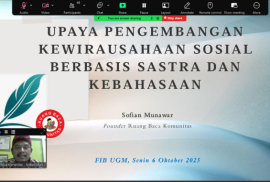Yogyakarta, October 17, 2025 – The Indonesian Culture and Language Learning Service (INCULS), Faculty of Cultural Sciences, Universitas Gadjah Mada (FIB UGM), has officially opened registration for the Regular Program – Even Semester of the 2025/2026 Academic Year. This program offers international students the opportunity to explore Indonesia through its language, arts, and traditions, right in Yogyakarta, a city renowned as the cultural and educational heart of the nation.
The program, which will take place from February 16 to June 19, 2026, is designed to provide a learning experience that focuses not only on language skills but also on cultural understanding. Through this initiative, INCULS contributes to the achievement of the Sustainable Development Goals (SDGs), particularly SDG 4 (Quality Education), by providing inclusive access to language and cultural education for learners from around the world.
Students are placed according to their language proficiency levels, ranging from Beginner (A1, A2) to Advanced (C2.1, C2.2). The curriculum covers reading, writing, listening, speaking, grammar, and vocabulary, delivered through interactive methods that connect classroom learning with real-life communication.
Beyond classroom activities, participants are invited to experience Indonesia more deeply through various cultural enrichment programs, such as Batik workshops, Gamelan (traditional music) classes, and visits to cultural and historical sites around Yogyakarta. Through these cross-cultural experiences, the program also supports SDG 10 (Reduced Inequalities) by fostering intercultural understanding and strengthening international friendships.
INCULS additionally offers elective courses such as Indonesian Culture, History and Politics, Tourism, and Translation, allowing students to broaden their academic perspectives based on their interests. At the end of the semester, participants will receive an official certificate and academic transcript, which can be transferred to their home universities.
Through collaboration with various international institutions and participation from students across the globe, INCULS also advances SDG 17 (Partnerships for the Goals) by fostering cross-cultural learning environments that enhance global understanding of Indonesia while strengthening international academic networks.
Registration for the Regular Program – Even Semester 2025/2026 can be completed online via admission.ugm.ac.id/registration. Further information is available at bit.ly/INCULSHowtoApply and bit.ly/INCULSBrochure
With the spirit of “At INCULS, language meets culture, and learning becomes a journey of discovery,” UGM invites international students to join and explore the richness of Indonesia’s language, culture, and humanity. ✨
[Public Relations, Faculty of Cultural Sciences UGM, Alma Syahwalani]









